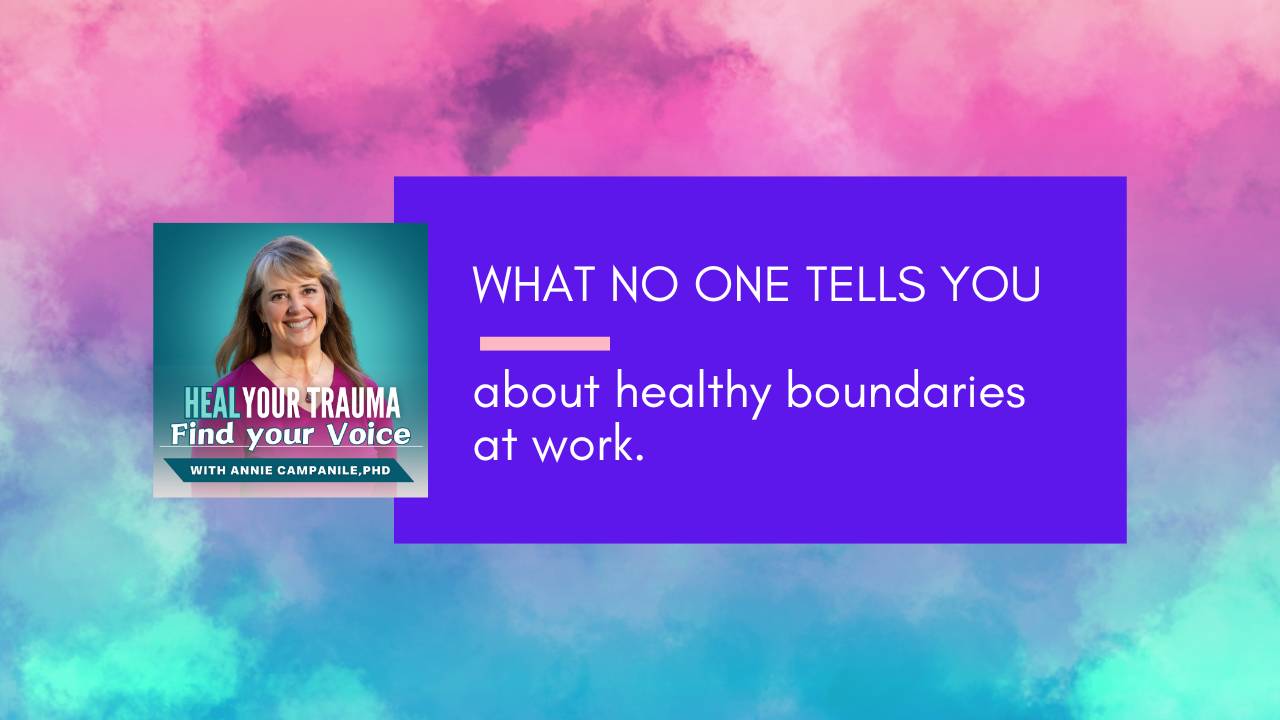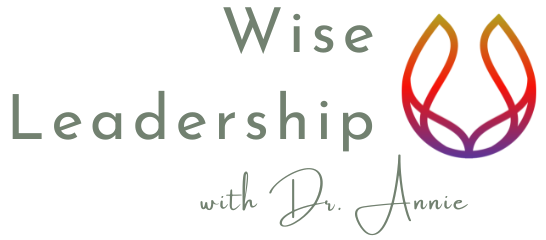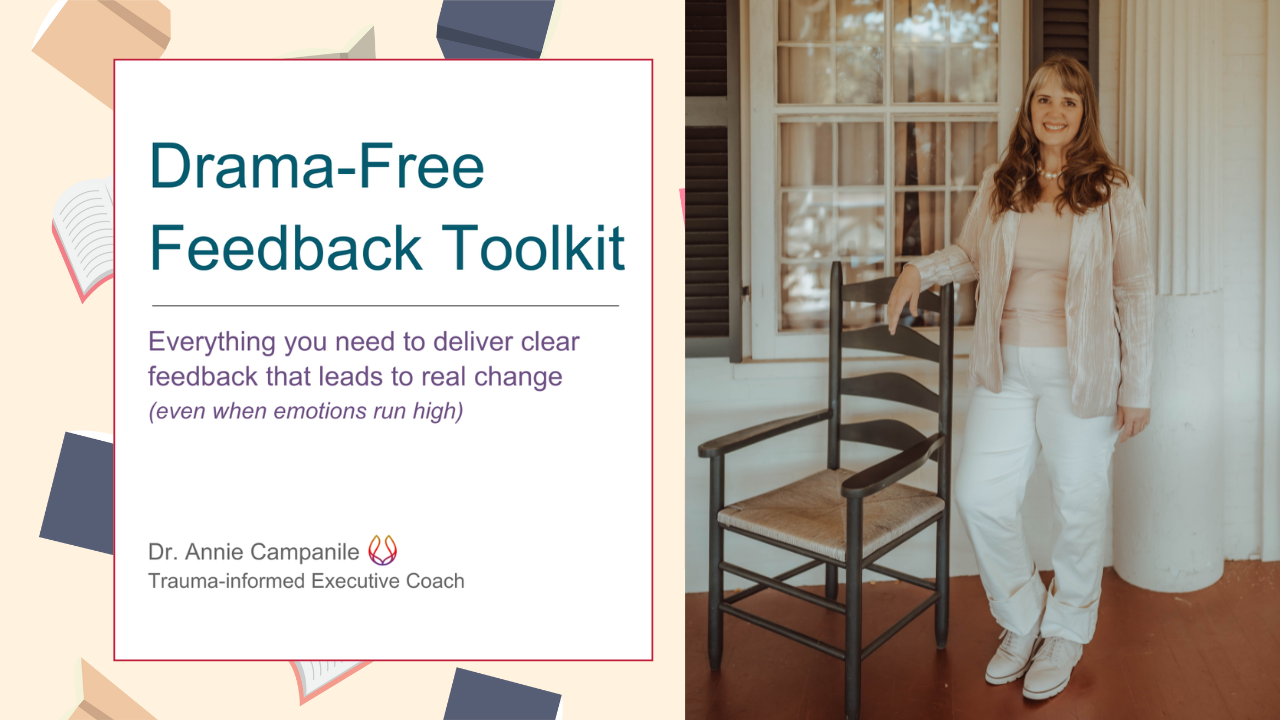Ep 21: What No One Tells You About Healthy Boundaries at Work
Jun 04, 2025
You told yourself you’d stop checking email after dinner…But somehow, it’s 11pm again, and your laptop is still open.
If you’re a high-achieving leader who wants to set healthy boundaries at work, but you keep getting pulled back in out of fear you’ll drop the ball, this episode is for you.
We’re talking about what’s really behind the late-night work cycle, and why most leadership advice about work/life balance completely misses the mark.
You’ll hear the story of an executive coaching client who went from anxiety and overworking to clear, confident boundaries, and how a simple body-based practice helped her rebuild self-trust without rigid rules.
In this episode, you’ll learn:
- Why discipline isn’t your problem—and what is
- The deeper reason high performers break their own boundaries
- What healthy boundaries actually look like when you’re responsible for results
- How to reset your nervous system with the Sunshine Exercise
- A simple self-reflection question to guide your next boundary decision
This isn’t about doing less.
It’s about leading from self-connection—not fear or survival mode.
Other episodes & topics mentioned:
Can't Relax after Work? Let's Fix That!
TRANSCRIPT
Episode 21: What No One Tells You about Healthy Boundaries at Work
[00:00:00] Do you ever feel like no matter how many times you say you'll stop working on the weekend, some part of you just knows you won't follow through? You want to have healthy boundaries with work, but you worry that stepping back, even a little, could let things fall through the cracks or make people think you're not doing enough.
You criticize yourself for not having work-life balance. But here's the thing no one really talks about: You're not breaking your own boundaries because you lack discipline. You're breaking them because deep down, you don't fully trust yourself, especially when everything feels urgent.
So if you're the kind of leader who opens your laptop after dinner, just to check one more thing, and suddenly it's 11 o'clock again, this episode is for you.
I'm Dr. Annie Campanile, trauma-informed executive coach, and today I'm pulling back the curtain on what healthy boundaries look like when you're responsible for real results, so you can stop working yourself to exhaustion and start setting boundaries from a place of self-trust.
Let me paint you a [00:01:00] picture. It's 10:47 PM on a Thursday night. You're sitting on your bed in your favorite pajamas, laptop balanced on your knees, promising yourself, “This is the last email.”
Your partner went to sleep an hour ago. The house is quiet except for the soft hum of your computer fan and the occasional ping of another email landing in your inbox.
Your shoulders are hunched. Your neck aches. Your eyes feel like sandpaper, they're so tired. But you keep going, because tomorrow's a big day, because your team needs you, because if you don't take care of it now, it'll be waiting for you - and maybe worse - when you wake up.
You consider setting your laptop aside, but then that familiar knot in your chest whispers, “If you don't stay on top of this, everything could fall apart.”
If you're nodding along right now, feeling seen in a way that's almost uncomfortable, that's because I've been there too. This exhausting cycle isn't about a lack of discipline or poor time management. It's about a [00:02:00] deeper belief that you can't trust the part of yourself that says, “It's time to rest.”
It's the belief that everything depends on you, and if you pause, something will break. This is what happens when caring people lead in organizations that reward self-sacrifice and constant availability.
I'm guessing you've tried to address this by setting rules for yourself, like no email after 8:00 PM or no laptops in the bedroom, or only urgent work on the weekends, but those rules felt like battles and you were losing, right?
Here's what I want you to consider: Healthy boundaries are not rigid rules. They're not about control. Instead, they're about something totally different, which is self-connection. They're about building enough trust in yourself to say, “I’ve done enough for today,” and believe it.
My husband Christopher says, something I really love, which is, “I trust my future self to take care of this.” When I hear that, even just now, [00:03:00] I get this wonderful wave of relief. And that's something I say to myself when I'm struggling to let go and rest. “I trust my future self to take care of this.”
Let me show you what healthy boundaries looked like for one of my clients, who I'll call Veronica. Veronica was a vice president at a fast growing tech company.
When she came to executive coaching, her first words were, “I'm not just tired, I'm depleted. My energy is gone, but there's so much to do every single day. I don't know how to get above it.”
Now, Veronica seemed like she had everything she wanted: a big title, meaningful work, and a team she really enjoyed. But inside she was unraveling. Veronica told me how she would eat dinner with her husband, only half present with her phone buzzing next to her on the table.
She wouldn't make it through even one episode of their favorite show before reaching for her laptop. And by midnight, she was still online trying to clear out her [00:04:00] inbox. She told me, “Even though I sacrifice time with my husband to get all my work done, I wake up feeling anxious, like I'm already starting the day behind.”
Veronica's body showed the strain of this pattern too. I could see how tight her shoulders were, and her eyes kept flicking toward her phone, even though it was face down on the table beside her.
When I asked her what she had tried in the past to change this pattern, Veronica said, “I've tried all kinds of things, telling myself no checking email after 6:00 PM no tech in the bedroom.
I even turned on my out of office message one time to see if that would help me to let go for the evening. But so far nothing has worked. I just get too anxious and I end up back online.”
I invited Veronica to pause and take a deep breath to let a little of that energy release from her body. It was clear that she was in a cycle driven by fear, self-doubt, and self-judgment. It was exhausting and she really [00:05:00] wanted to break it so she could not only succeed at work, but also enjoy the rest of her life.
Since the rigid rules she had tried setting for herself had not helped, I offered her a different approach to boundaries, a way to discern what a healthy boundary could look like for her, not driven by fear or self-doubt, but by self-trust and self-connection. I guided her through a simple body-based exercise that I call the Sunshine Exercise, which I described in episode 18.
It's a lovely way to calm anxiety and reconnect with your full self. You can try it with me now if you want. First, close your eyes or look down to avoid distraction. Then place a hand on your chest. Take a nice full breath, and now imagine that you are being bathed in warm golden sunlight.
Imagine that the sunlight is the perfect temperature for you and it will never burn you. [00:06:00] As the sunshine bathes you, imagine that it's not only covering your outside, but it's flowing through your body, filling you with warm sunlight.
Keep breathing deeply and give your attention to that sunshine until you feel a little bit more calm, a little bit more grounded.
When Veronica did the sunshine exercise, I watched as her shoulders dropped, her breathing slowed down, and then I said, “With your eyes still closed, and your hands still on your chest. Ask yourself this question, ‘What boundary with work would support the kind of life that I want to lead at home?’”
Veronica thought for a moment, and then she looked up at me and she calmly said, “Closing my laptop and putting it away at 7:00 PM.”
I asked Veronica, “How does it feel to you to make that statement right now? What's different about it as compared to when you set the rule of closing your laptop at 8:00 [00:07:00] PM.”
Veronica said, “Well, this time I feel calm in my body. I feel like it's actually a choice and not like some rigid rule that I have to comply with in order to be good to my husband or in order to do the right thing at home. It actually feels like something I want to do.”
As we chatted more, I learned that in the past when Veronica tried to enforce a rule like no email after eight, she did it with a clenched jaw and a tight chest, hoping that it would force her into balance. But that rigid boundary always felt like a punishment, a line in the sand that actually triggered her anxiety even more.
It was a line that she was destined to cross, because her survival mode would take over and compel her to get her laptop back out. And then when she did that, she felt like she had failed.
But this time would be different, because by doing that Sunshine Exercise first, Veronica was able to calm her nervous system, let her survival brain kind of take a back seat [00:08:00] and listen to her deeper knowing. Listen to that voice inside of her that, said, “You know what? I want to close my laptop at seven. I want to spend time at home not thinking about work.”
So this time, closing her laptop at 7:00 PM didn't become a rule that she had to meet. It became an idea of self-care and a choice that she could make. Some nights she still worked a little later than seven, but when she did, she didn't do it on autopilot. She paused, she did the Sunshine Exercise, and then she asked herself the question, “What boundary with work would support the life I want to lead right now?”
So she was able to make a conscious choice to work a little bit later, rather than continuing to work out of anxiety or fear that something would fall through the cracks. That's what healthy boundaries look like. They're not fixed lines, they're not moral tests.
They're responsive choices, made from a place of self connection, [00:09:00] emotional regulation, and leadership clarity, because you're really leading yourself.
So if you've been wondering what healthy boundaries with work could look like for you, here's your invitation. This week, take five minutes to practice the Sunshine Exercise and to ask yourself that one question. Let me walk you through the steps once more.
First, close your eyes or look down to avoid distraction. Then place your hand on your chest. You might want to press a little harder or press a little lighter. Use the amount of pressure that feels good to you.
Then take a nice full breath and let it out completely. And now imagine that you are being bathed in the most perfectly warm, golden sunshine.
The temperature is perfect for you and it will never burn your skin. And now as you imagine that sunshine [00:10:00] bathing you on the outside, imagine it also can bathe you on the inside. You can be completely filled with this sunshine.
As you feel your body relaxing a little bit, you'll notice your survival response calming down, and then you can ask yourself this question, “What boundary with work would support the kind of life I want to lead at home?”
Then listen - not just with your thoughts, but also with your body sensations, your emotions, and your inner knowing. Because you don't have to work yourself to the point of depletion to be a great leader, and you don't have to choose between professional success and emotional wellbeing.
You can have both, and you truly deserve both, even if you choose to close your laptop at 7:00 PM.
Thanks so much for joining me for this little three episode series on Workplace Boundaries. If you enjoyed today's episode, would you please share it with a colleague?
And if you're [00:11:00] looking for more personalized support with leadership boundaries, burnout, or communication, check out my executive coaching program at anniecampanile.com or click the link in today's show notes.
Next week we'll look at what happens when a team member comes to you feeling overwhelmed and emotional and you want to support them, but also protect your own wellbeing. I'll share a simple, yet powerful way of giving the gift of empathy without absorbing the other person's emotions or energy.
Until then, I'm Dr. Annie Campanile reminding you that thriving in leadership is possible and you don't have to do it alone. See you next time.


